We may earn revenue from the products available on this page and participate in affiliate programs. Learn More ›
Highlights
- The typical cost range to install a sump pump is between $1,200 and $2,500, with a national average cost of $1,500.
-
Some of the main factors that affect the cost of sump pump installation include the type and size of the sump pump, the type of floor, the pump location and accessibility, the home’s geographic location, the cost of labor and permits, and drainage system installation.
-
There are many benefits of installing a sump pump, such as flooding and water damage prevention, mold and mildew prevention, a lower risk of pest infestations, protection against foundation cracks, lower basement humidity levels, safety, and an increased home value.
-
Sump pump installation is a project best left to the professionals. It’s a complex project that may be possible for a homeowner with electrical and plumbing training, but the average homeowner likely won’t have the skills to safely install the system.
If a homeowner needs to move water away from their home’s foundation and prevent it from seeping into the basement, they need a sump pump. A sump pump is installed at the lowest point in the basement in a sump hole or pit. Any water that makes its way into the house will flow to this lowest point. The sump pump will then activate and draw moisture away from the foundation. Sump pumps are essential to prevent flooding and water damage in your home.
According to Angi, sump pump costs range from $1,200 to $2,500, with the national average at $1,500. The initial installation will involve digging, electrical upgrades, and plumbing costs. Sump pump replacement is less expensive than installing one for the first time.
Factors in Calculating Sump Pump Cost
Several factors affect overall sump pump cost. Prices can differ from the national average due to flooring type, pump location and accessibility, geographic location, type of sump pump, labor costs, permit fees, pump size and quality, and the drainage system.
Floor Type
If the basement has a dirt floor, digging the sump pump pit will be easier and faster than digging through a concrete floor. Digging through a dirt floor costs between $300 and $500, or $5 to $10 per linear foot, depending on how deep the drainage pipes need to go. Sump pump installation in a concrete floor averages between $2,500 and $5,000 since jackhammers and other specialized equipment are required to break through the surface.
Pump Location and Accessibility
Installing a sump pump in a hard-to-reach area like a crawl space will significantly add to the project’s cost by several hundred dollars. If the plumbing in that area is complex and densely packed, it will increase the price.
Geographic Location
Sump pump cost will vary because of geographic location and the cost of labor in different regions. Large, urban areas have higher labor costs than more rural areas. Permit fees and the cost of materials also depend on where the home is located. Homeowners can get multiple quotes from reputable professionals in their area to find one that fits their budget.
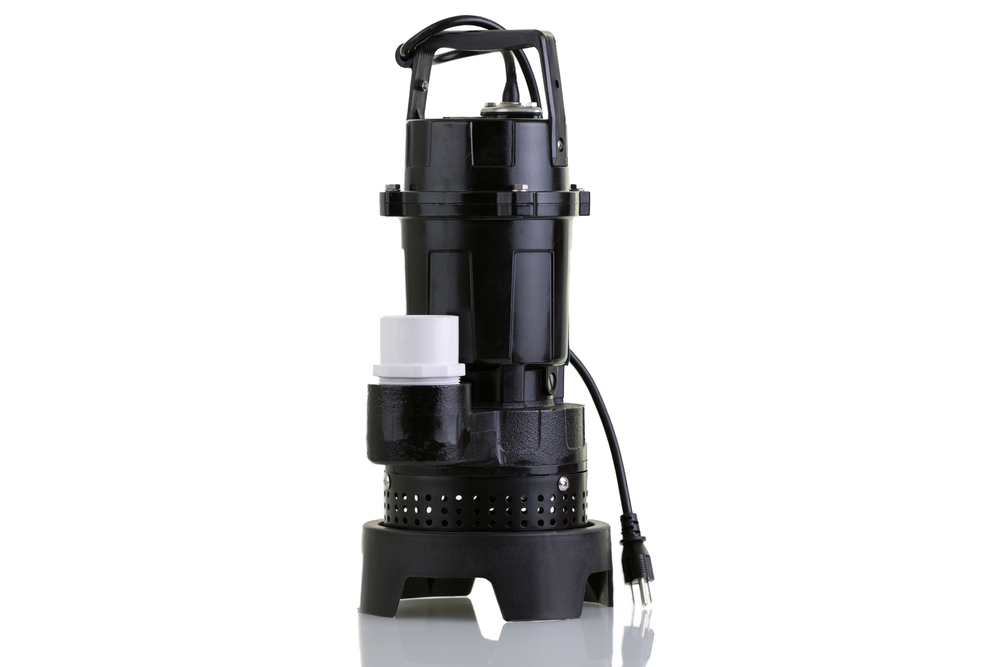
Sump Pump Type
There are two types of sump pumps, pedestal and submersible, but they both work in the same way. Inside the pump, there is a float that will lift as the water level rises. When the water gets to a certain level, the pump will activate to draw it in and pump it out of the drain. These sump pumps can be powered by battery, water, or both. The battery- and combination-operated sump pumps cost approximately twice as much as the water-powered pumps.
Sump pumps can be made of plastic or metal. Plastic sump pumps resist corrosion, but they don’t handle high pressure very well. Metal pumps are more vulnerable to corrosion, but they’re stronger than plastic units. Metal sump pumps are typically double the price of plastic ones. The best sump pump for a home will depend on its location and the homeowner’s budget.
Labor and Permits
Labor costs typically run between $45 and $200 per hour for installation. Replacements usually take around an hour, while a new installation can take between 2 and 4 hours. Sump pump installation requires electrical and plumbing work, and some cities may require a permit for this type of project; homeowners will want to check their local laws to see if they need a permit.
Pump Size and Quality
The size of the sump pump needed for a home is not based on the basement’s square footage but on the amount of water it needs to remove. Basements prone to flooding will need a stronger sump pump, regardless of basement size. The more water the sump pump needs to remove, the more horsepower is needed. Here are most three common sizes of sump pumps.
- 1/4 horsepower. This is not a strong sump pump, but it will work if the homeowner doesn’t have a very wet basement and are on a tight budget. Sump pumps with .25 horsepower cost between $50 and $200.
- 1/3 horsepower. These are the standard-size sump pumps in most homes. .33 horsepower pumps typically cost between $90 and $250.
- 1/2 horsepower. This is the most powerful type of sump pump for homes. A .5 horsepower pump will remove 3,000 gallons of water per hour. If a home has a very wet basement, this type of sump pump will work well. They usually run between $160 and $400.
Drainage System
Updating the drainage system or digging a new one can cost $4,000 to $12,000. The drainage system calls for removing a 24-inch area of dirt and concrete from the inside perimeter of the basement. Gravel, drain tiles, and a basin are added before replacing the concrete. If a homeowner has a powerful sump pump that needs to remove large amounts of water, the drain pipes will need to be wider to accommodate the amount of water.
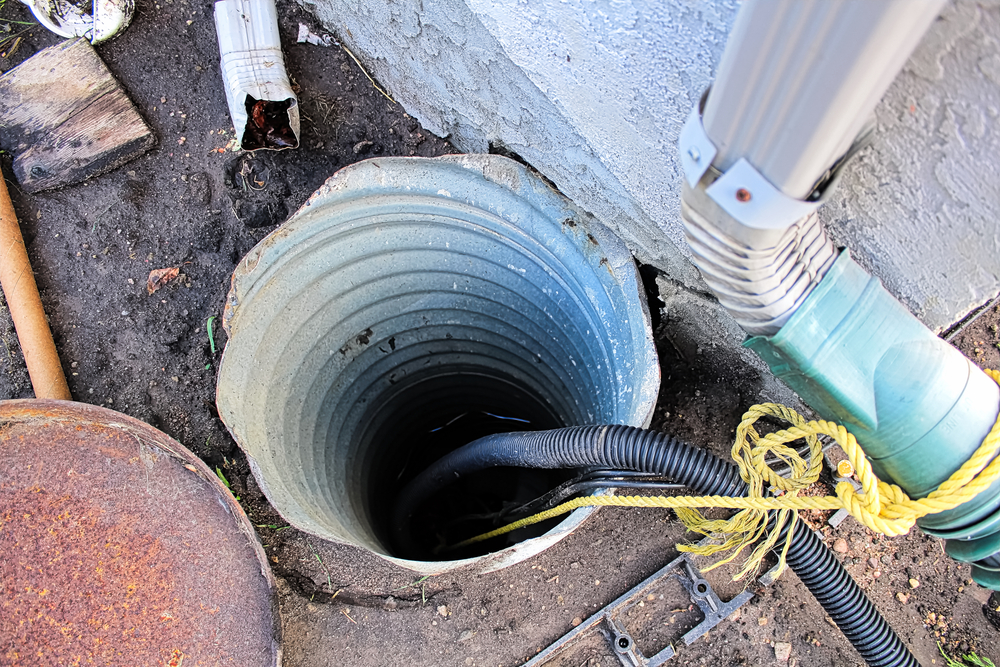
Additional Costs and Considerations
When budgeting for sump pump costs, there are additional price factors and considerations for homeowners to keep in mind. These can include sump basin quality, flood insurance, maintenance, repairs, battery backup, reserve pumps, and filters.
Sump Basin Quality
The sump pump basin should be made of heavy-duty plastic and look like a trash can. It should be strong and not flex or collapse. The basin is installed below the floor, and the sump pump goes inside. The sump pump will activate and push the water out via the drainage pipes as the basin fills with water. A 17-inch basin costs around $23, and a 30-inch one runs about $30. A tall basin costs approximately $60.
Flood Insurance
Even with an actively working sump pump, there is always a risk of flooding. For peace of mind, homeowners may want to consider taking out a policy with one of the best flood insurance companies. Most flood insurance policies will include building and contents coverage. Flood insurance costs between $438 and $1,308 per year, with a national average cost of $834.
Maintenance
Sump pump maintenance can cost up to $250 a year to get the pump checked and ensure it’s running correctly. Sump pumps should be inspected to check for debris that may clog the pump. One way to avoid clogs is to purchase an airtight cover for the sump pump. If the pump isn’t turning on as it should, a professional may need to be called to remove any obstructions. If a homeowner notices that there is no water in the basin or if the sump pump is making strange thumping, rattling, or gurgling noises, they’ll want to call a plumber. A sump pump should cycle on and off during wet periods. If the pump is constantly running and not cycling off, homeowners can call a plumber to see if the pump needs to be replaced or repaired.
Repairs
The average cost of sump pump repair is between $200 and $500. A plumber or sump pump pro can repair the check valve, float switch, discharge pipe, pump motor, or lifting handle. Homeowners will want to weigh their options and determine whether purchasing a new sump pump would be worth it in the long run instead of paying for repairs over time.
Battery Backup
The best battery backup sump pumps will ensure that a pump keeps working, even if the power goes out. Sump pumps with battery backups cost $1,220 to install in a basement, yard, or crawl space. Models that run on water pressure with a battery backup can cost a few hundred dollars more.
Reserve Pumps
Homeowners who live in a wet area at risk of heavy flooding will want to consider having multiple sump pumps in their basement. If one pump is not enough to remove all the water it needs to, having pumps in reserve to help can make all the difference in keeping the home dry.
Filters
A filter can extend the life of a sump pump by filtering out sediment and other particulates. A sump pump filter can also keep clogs and debris at bay. These filters cost an average of $60.
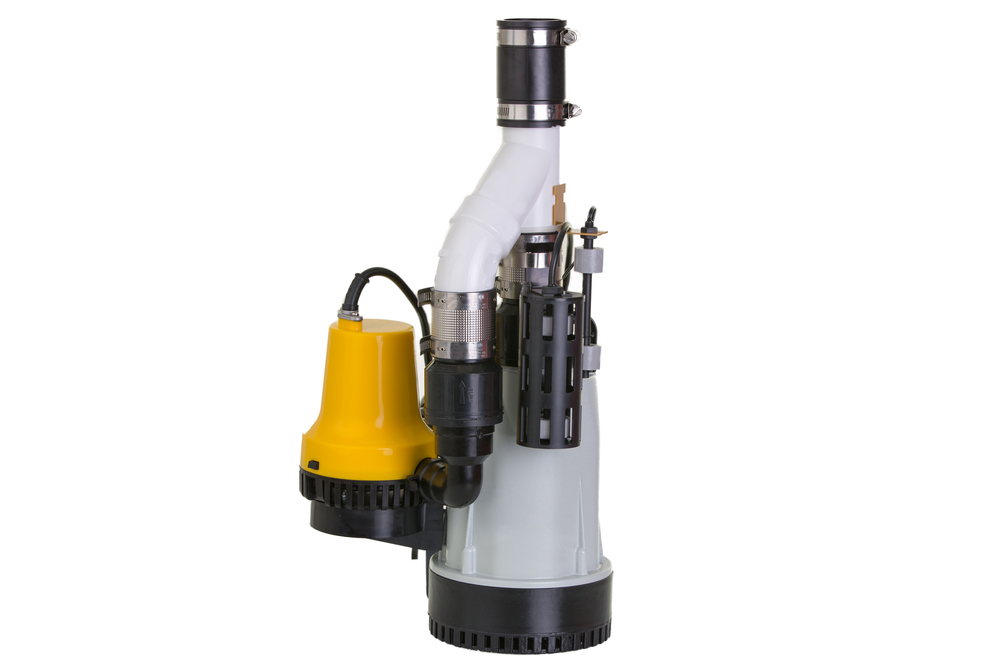
Sump Pump Installation by Type of Sump Pump
There are two types of sump pumps: pedestal and submersible. These types of pumps can be water powered, battery powered, or a combination of both.
Pedestal
The base of a pedestal sump pump is submerged, and the rest of the pump is above the basin. Pedestal sump pumps have a 1/3 to 1/2 horsepower motor. These pumps can remove up to 35 gallons of water per minute. The motor is on top of a pedestal, and a hose goes down into the basin. The hose will draw the water up and out of the hole and out through the drain. Pedestal sump pumps are easy to access and service since they sit outside the basin, but it means they’re loud when they’re running. Pedestal pumps can cost from $60 to $170, and the average lifespan is approximately 20 to 25 years.
Submersible
A submersible sump pump sits entirely underwater in the basin. This type of sump pump can have up to a 3/4 horsepower motor and drain up to 60 gallons of water per minute. Since the water muffles the sound of the motor while it’s working, a submersible unit is quieter than a pedestal pump. They are more challenging to access and service since they will need to be removed from the water. These sump pumps can cost between $100 and $400, and the average lifespan is around 5 to 15 years. Some higher-quality pumps can last from 10 to 30 years.
Water-Powered
A water-powered sump pump only needs water to work. Flowing water through the pipe creates suction that will drain the water out of the basement. The water flow commonly comes from the city’s water system. Some areas of the country are banning and eliminating water-powered sump pumps due to the amount of water waste. These types of pumps usually need to be inspected yearly by a licensed inspector. The average price of a water-powered sump pump is $100 to $700.
Battery-Powered
A battery-powered sump pump operates on a marine-type, deep-cycle battery. These sump pumps can remove more water than a water-powered unit, and a smart app can monitor it. These efficient pumps can run from $150 to $800.
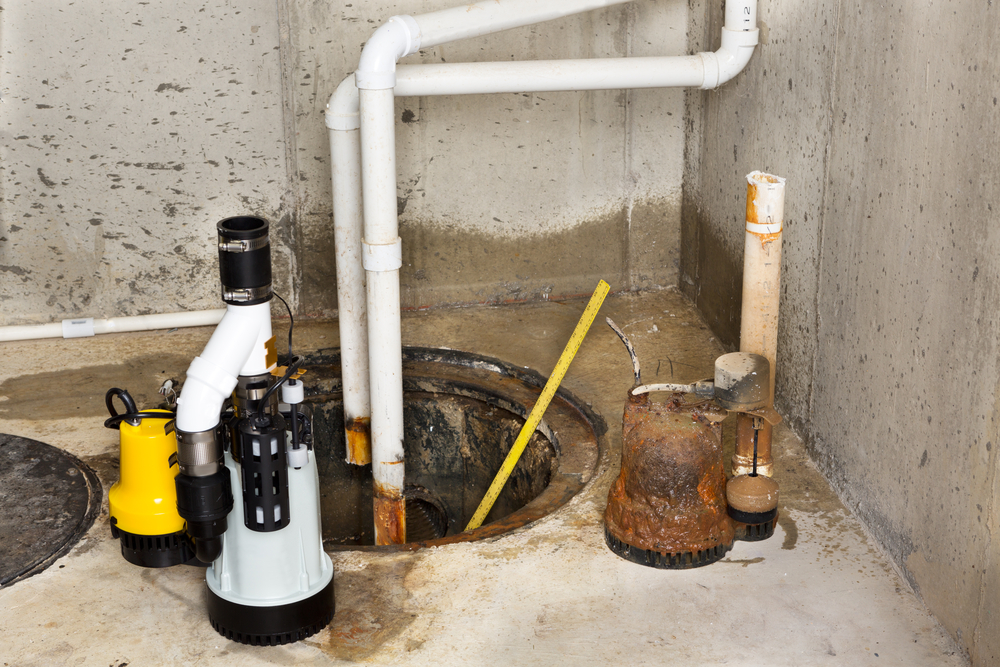
Do I need sump pump installation or replacement?
There are a few red flags that will alert homeowners if a sump pump needs to be replaced. If the basement is flooded, that is an obvious sign that the sump pump is not working correctly. If it’s making strange noises, is not working at all, or if the pump isn’t working while all the other electrical outlets in the house are, there may be an electrical issue inside the pump.
Strange Noises
By their nature, sump pumps make noise when they work. Any unusual sounds or noises can be a clue that the sump pump is not working correctly. Water cannot be removed from the basement if the impeller is bent, and flooding will soon be a genuine concern. If a homeowner hears strange gurgling, thumping, or rattling coming from the pump, it may need to be replaced.
Broken Sump Pump
If the sump pump isn’t working and the float switch has been checked, it may need to be replaced. It may be cheaper for the homeowner to replace the broken pump than keep paying to get it repaired. It’s best for a homeowner to move quickly if their sump pump is broken, and to have the names of the best water damage restoration services (like ServiceMaster Restore and ServPro) handy in case there’s a heavy rainstorm before the sump pump can be replaced.
Electrical Issues
If the sump pump is on but doesn’t pump water, there could be an electrical issue inside the pump. If a working sump pump uses excessive energy, it may be more cost-effective for the homeowner to replace it with an energy-efficient model.
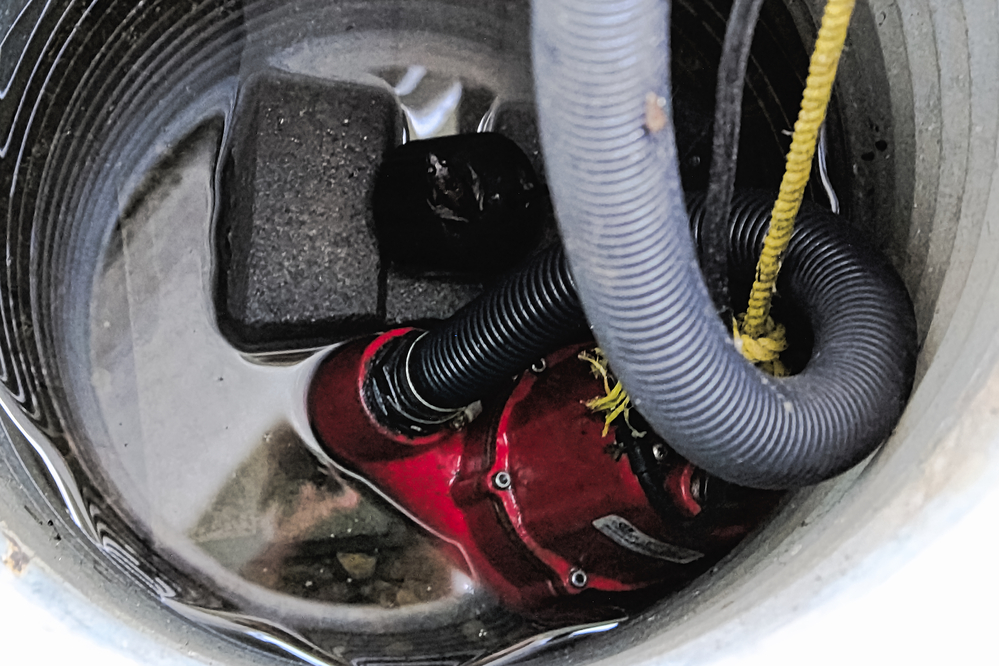
Benefits of Installing a Sump Pump
A sump pump prevents basement flooding and damage to a home. In the end, the cost of the pump and installation is worth the benefits of installing a sump pump.
Flooding and Water Damage Prevention
A sump pump will impede flooding by directing water away from the basement and foundation. This will prevent water damage to the home and the residents’ belongings, and therefore minimize water damage restoration costs. By draining the water away from the home, the sump pump can also put a stop to pooling water and excess moisture.
Mold and Mildew Prevention
Mold and mildew grow when an area is damp. Mold and mildew can cause structural damage to a home and severe health issues to those with allergies, asthma, or other respiratory illnesses. Sump pumps remove the problem of standing water and excess moisture where mold and mildew thrive.
Pest Prevention
Damp basements make a good home for insects and rodents—especially destructive pests like termites, who can be especially attracted to moist wood. A sump pump helps keep a basement dry and can help eliminate the risk of insects and pests making themselves at home and threatening the homeowner’s comfort, health, and safety.
Foundation Crack Prevention
When water builds up around a home’s foundation, it can cause stress and cracks in the foundation. Since a sump pump removes and drains water away from the foundation, it aids in eliminating the dangerous pressure around the basement walls. This can result in fewer foundation cracks, and the homeowner will have lower foundation repair costs over time.
Reduced Basement Humidity Levels
Excess humidity can cause musty odors, growth of mold and mildew, and damage to the interior of the basement and appliances. By installing a dehumidifier and draining it to the sump pump basin, the sump pump can eliminate water in the basement that leads to excessive humidity levels.
Electrical Outlet Safety
Standing water can cause electrical issues, wire damage, and damage to electronics. Standing water can even cause an electrical fire. A sump pump can help keep the homeowner’s electronics and home safe by eliminating standing water and moisture issues.
Increased Home Value
Sump pumps in a basement are a positive addition to a home. It signifies the homeowner has taken an active role in eliminating any potential water problems in the basement. Potential home buyers may see a sump pump as a worthwhile addition if the house is in an at-risk area for flooding.
Sump Pump Installation: DIY vs. Hiring a Professional
Installing a sump pump is a dirty job. If a homeowner has the knowledge, experience, and the tools to install one, they’ll need to pick the right spot in the basement for installation, have access to or install a ground fault interrupter (GFI) outlet, excavate a hole that is at least 10 inches wider and 6 inches deeper than the sump pump, attach the adapters, install the pump check valve to divert the backflow of water into the home’s water system, and install drainage pipes to direct the water at least 4 feet away from the house.
Working with electricity and water can be a dangerous combination, and many homeowners will opt to hire a professional to complete the installation. If a DIYer doesn’t install the sump pump properly or makes an electrical or plumbing mistake, the repairs could be costly. The price of hiring a professional who installs sump pumps may be worth the extra money for peace of mind.
How to Save Money on Sump Pump Cost
Sump pump installation can be pricey, especially for homeowners installing one for the first time. Although the benefits outweigh the cost, there are several ways for homeowners to reduce the cost of sump pump installation to make it easier to afford this vital home addition.
- Stick to the basics. Although it’s tempting to opt for add-ons such as battery backups, pump filters, and water level alarms, this will add to the cost of installation.
- Keep up with maintenance. A sump pump will last longer if a homeowner performs regular maintenance, such as cleaning and changing the filter.
- Schedule annual inspections. Although paying for an inspection will add to the upkeep cost, it could ultimately save the homeowner money since a professional can identify issues with the sump pump and fix or replace the system before it fails and causes expensive water damage to the home.
- Look for discounts. Manufacturers and local suppliers often offer discounts on sump pumps. Purchasing the equipment while it’s marked down will save on the overall cost.
- Shop around. Getting installation quotes from several professionals will help homeowners compare estimates and choose the best option for their needs and budget.
Questions to Ask About Sump Pump Installation
Asking a professional the right questions about sump pump costs can help homeowners minimize miscommunication, save money, and get the desired results. Here are some questions for homeowners to ask a sump pump professional.
- What is your service area?
- Are you licensed and insured?
- Do you have workers’ compensation?
- Do you offer a warranty?
- Who will install the sump pump?
- Are all your employees that do plumbing licensed?
- Do you have references?
- How long have you been installing sump pumps?
- How long will the installation take?
- How do you charge for labor?
- How many people will be working on this job?
- How long will it take to complete the job?
FAQs
Deciding on sump pump installation while staying within a budget can be a daunting process for homeowners. Here are some frequently asked questions about sump pump costs to help guide homeowners in their decisions.
Q. How long does a sump pump last on average?
On average, a sump pump can last about 7 to 10 years. Some better quality pumps can last between 10 and 30 years.
Q. Can I install a sump pump on my own?
You can, as long as you have extensive plumbing and electrical knowledge. Specific tools, skills, and knowledge are required to get the job done right. Many homeowners prefer to hire a sump pump contractor for installation to know that the pump will be installed correctly and, and a pro will offer a warranty—and peace of mind.
Q. Does homeowners insurance cover sump pump replacement?
In most cases, a homeowners insurance policy does not cover sump pump replacement. You can add a rider to the insurance policy to cover damage to your home, belongings, and the cleanup if the sump pump fails. The additional rider does not cover repair or replacement of a sump pump.
Sources: Angi, HomeAdvisor, Fixr, HomeGuide, HomeLight, Costimates


